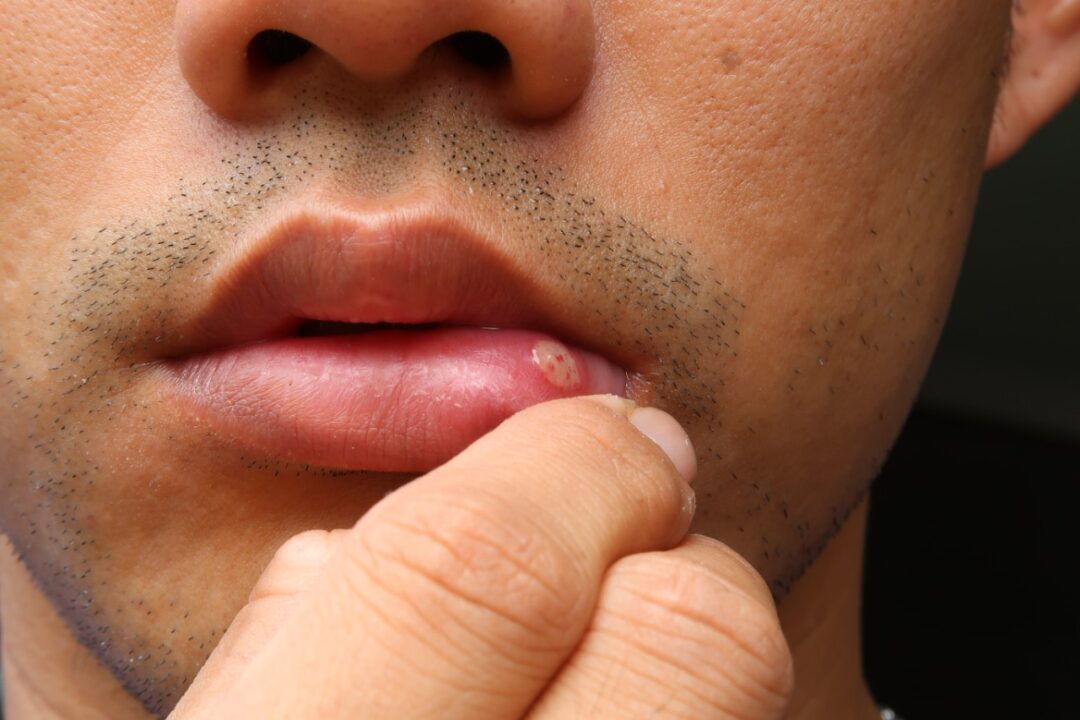What is a canker sore? |

Canker sores, also known as aphthous ulcers, are small, shallow lesions that develop on the soft tissues in your mouth, most commonly inside the cheeks or lips and at the base of the gums. They are very common, affecting up to 20%-40% of the U.S. population at some point in their lives. Canker sores are most common during adolescence and young adulthood, becoming less frequent as we get older.
What do canker sores look like? Most canker sores are round or oval and less than 10 mm (1/3 inch) in diameter. A second type, known as “major” aphthous ulcers, can be much larger. While the smaller sores heal in from 7-10 days, these larger lesions can take up to a month to heal. A third type of aphthous ulcer, herpetiform ulcers, consists of multiple of small ulcers.
What causes aphthous ulcers? The exact cause of aphthous ulcers is not known, although they often occur following an injury, such as when someone has bitten their tongue or cheek. Other factors associated with their development include:
- Stress
- Viral infections
- Certain foods including chocolate, coffee, strawberries, nuts and citrus foods
- Toothpastes containing sodium lauryl sulfate
- Food allergies
- Hormonal changes
- A diet deficient in Vitamin B12, folic acid or iron
How are aphthous ulcers diagnosed? The diagnosis of aphthous ulcers is made based on the characteristic appearance and clinical course. They can be confused with other mouth ulcers such cold sores or even mouth cancer. Unlike cold sores, which are caused by the herpes simplex virus (HSV), canker sores don’t occur on the surface of your lips. Mouth cancer may be suspected when a mouth lesion does not resolve by a couple of weeks.
How are canker sores best treated? There are a number of prescription, over-the-counter, as well as “home remedies” available for treating canker sores. Most minor canker sores heal on their own, however, so in many cases, specific treatment may not be necessary.
Self-care measures for easing the discomfort associated with aphthous ulcers include:
- Rinsing the mouth with either a solution of ½ teaspoon salt dissolved in 8 ounces of water or diluted hydrogen peroxide. Another mixture that may be helpful consists of 1-2 tablespoons of Maalox mixed with ½ tablespoon of liquid diphenhydramine (Benadryl). A teaspoonful of this mixture can swished and then spit out, up to four times a day.
- Applying a small amount of milk of magnesia or a paste made of baking soda.
- Over-the-counter products that contain a numbing agent, such as Orabase-B, Anbesol and Orajel.
Some of the most commonly prescribed medications for aphthous ulcers include mouth rinses containing the steroid dexamethasone or the antibiotic tetracycline, topical pastes containing either a steroid (Kenalog in Orabase) or amlesxanox (Aphthasol paste 5%), and topical cauterizing agents such as Debacterol (Sulfuric acid/Phenolic Solution).
Can aphthous ulcers be prevented? In many cases, the answer is yes, but some detective work may be necessary to determine the factors that are responsible for their development. If outbreaks follow eating foods such as nuts, chips, pretzels, or acidic fruits, such as oranges, the food that triggered the outbreak may need to be avoided. Regular brushing after meals and flossing once a day can keep your mouth clean and free of foods that might trigger a sore. Check out the toothpaste label to see if it contains sodium lauryl sulfate, which has been associated with the development of canker sores. In some people, dietary supplementation with vitamins B and C, zinc, or iron or taking the probiotic, acidophilus, may prevent recurrences. Avoiding injury to the mouth, e.g. use of a soft tooth brush, may also help prevent the development of canker sores.
Final word: Most canker sores go away on their own in a week or two. Because of the possibility of a more serious problem, such as mouth cancer, check with your doctor or dentist if you have unusually large or painful canker sores or canker sores that don’t seem to heal.
If you have any more questions just Ask Hanna, our health advisors are here to help.
Image: ©Shutterstock / Nattaro Ohe








